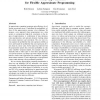Free Online Productivity Tools
i2Speak
i2Symbol
i2OCR
iTex2Img
iWeb2Print
iWeb2Shot
i2Type
iPdf2Split
iPdf2Merge
i2Bopomofo
i2Arabic
i2Style
i2Image
i2PDF
iLatex2Rtf
Sci2ools
OOPSLA
2015
Springer
2015
Springer
Probability type inference for flexible approximate programming
In approximate computing, programs gain efficiency by allowing occasional errors. Controlling the probabilistic effects of this approximation remains a key challenge. We propose a new approach where programmers use a type system to communicate high-level constraints on the degree of approximation. A combination of type inference, code specialization, and optional dynamic tracking makes the system expressive and convenient. The core type system captures the probability that each operation exhibits an error and bounds the probability that each expression deviates from its correct value. Solver-aided type inference lets the programmer specify the correctness probability on only some variables—program outputs, for example—and automatically fills in other types to meet these specifications. An optional dynamic type helps cope with complex run-time behavior where static approaches are insufficient. Together, these features interact to yield a high degree of programmer control while ...
Related Content
| Added | 16 Apr 2016 |
| Updated | 16 Apr 2016 |
| Type | Journal |
| Year | 2015 |
| Where | OOPSLA |
| Authors | Brett Boston, Adrian Sampson, Dan Grossman, Luis Ceze |
Comments (0)

